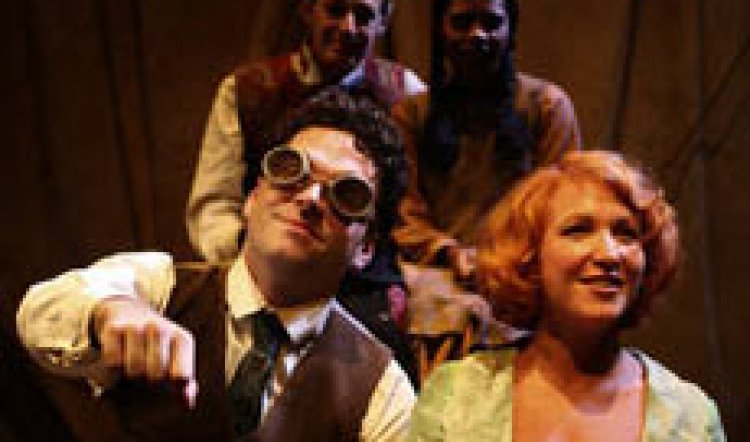
Troupers
The first production of 2007 for Sydney Theatre Company is a curate's egg: parts are good and other parts ... not so good. The good parts have to start with Blazey Best as the young(ish) yet already world-weary trouper whose music hall career on the D-grade circuit is not going anywhere fast.
Best is an actor who can pretty much do anything a role requires of her, but - to date - very little that she's been given has even come close to stretching her. One suspects that because she is naturally funny, scrumptious and ebullient, she is somewhat underrated as a dramatic actor, or even, underrates herself. Now, in the pivotal role of Elsie, she reveals the capacity to sustain a complex character of the kind of depth and sensitivity that hitherto has only been glimpsed in passing.
Elsie is a rough diamond, not exactly the tart with the heart of gold, but close enough to be plaintively hopeful of something better; and not about to cast the first judgemental stone at anyone else either. Her emotional range is a slow-burning thing: from brassy to compassionate, raucously irreverent to wrenching tenderness; altogether a memorable, three-dimensional and immensely strong performance.
It is as well for the play that Best is so good, because she is rarely off stage and virtually carries the production. Although supported by a fine, multi-skilled cast (Alexis Fishman, Josh Quong Tart, Toni Scanlan, Ryan Hayward and Arky Michael - who really can play the piano accordion), it's really only when the script focus is on her that the oddly unbalanced elements hold together.
The play, by Michael Cove, itself is interesting and somewhere in the vicinity of saying something important. Troupers is a play on words: on the one hand, there are the game old stagers of theatrical legend, and on the other, the game young blokes of Anzac legend. In a hope-forsaken dot on the map of post-WW1 Australia, these two groups collide when Issie (Barry Otto), Elsie's wily old partner in an act as threadbare as the seat of his pants, works out that rather than forget the war, there are thousands - mostly bereft women - who want to remember.
[page]It's a credible idea and one which has not been much examined in popular culture. For Australian women, in particular, whose young men marched off to die on the other side of the world, it's not the war itself, but somehow recalling and reconnecting with the men lost to it. At that time, right across the Empire, seances and the ouija board came into their own as despairing wives, mothers, sister and lovers attempted to assuage grief and disbelief with these threadbare devices. For these people - with no gravestone to focus upon, no real sense of what happened and where - the chance of contact, no matter how unlikely or tenuous, was better than the void into which they had fallen with their dead.
When Issie sees the possibilities, he and Elsie work up a bit of a scam act to take advantage. With little conviction aside from the need to eat and pay the next train fare to the next town, Elsie reluctantly begins "channelling" rudimentary messages from the dead boys. And it's suddenly a lot more successful than the dead horse of a song and dance and patter routine they've been flogging.
The scam - and the play - take a sharp turn from straight up comedy-drama when the pair happen upon Theresa, an Aboriginal girl who is press-ganged into the act with disturbing and dangerous consequences (Natasha Wanganeen, in an intelligent and potent performance). It turns out that Theresa really can talk to the dead. See them too - in particular Toffee (Ryan Hayward). This sweet boy-dead soul wanders restlessly, his face as chalky as the French clay that cakes his boots and puttees. He is unable to lie in his unquiet grave, not because of the horrors of the trenches of "Wipers" but, ironically, because of secret horrors that happened at home.

It is in these strands that Troupers is at its most absorbing: the casual racism - towards Black and Jew - of those times is tossed about like awful little knuckles of forgotten truths. While the ghosts are as much of love lost and illusions shattered as they are of dead heroes. For the two charlatans of the tent show, the nice little earner suddenly turns into something that plunges headlong into melodrama before the evening is over.
Aside from a play whose various strands and ideas are ambitious but yaw wildly from real coherence, the other central performance - Barry Otto's Issie - also seems to be part of the problem. Otto is a happy physical clown: much capering and prancing punctuates his character's descent from merry hope to wrung-out despond. He is also inordinately fond of a "voice" and this one is a corker. So exaggerated in its swoops and elaborately elongated tones is Issie's singsong delivery that it's often hard to listen to what he's saying rather than get caught up on the rollercoaster. The result is that the play's forward momentum loses traction as Issie cavorts and plays with his vowels. Issie is an East End Jew - from Whitechapel - he says. But where he found his accent is anyone's guess: nowhere near E1 that's for sure.
Jean-Pierre Mignon's direction of the ensemble makes good use of a modified Wharf space (two extra entrances with actors also using the aisles) and economic and handsome use of actors who double and treble their roles throughout. The ratty old show tent setting and beautifully realised costumes (Christina Smith) evoke the sawdust and California Poppy world of the travelling entertainers and are imaginative rather than elaborate.
Troupers is thought-provoking and full - perhaps too full - of good ideas; it also marks a powerful step forward for Blazey Best and that's something to be glad about.
Troupers at Wharf 1 to March 18; www.sydneytheatre.com.au or 9250 1777.
You can hear an interview with Barry Otto in episode 12 of StageCast.



